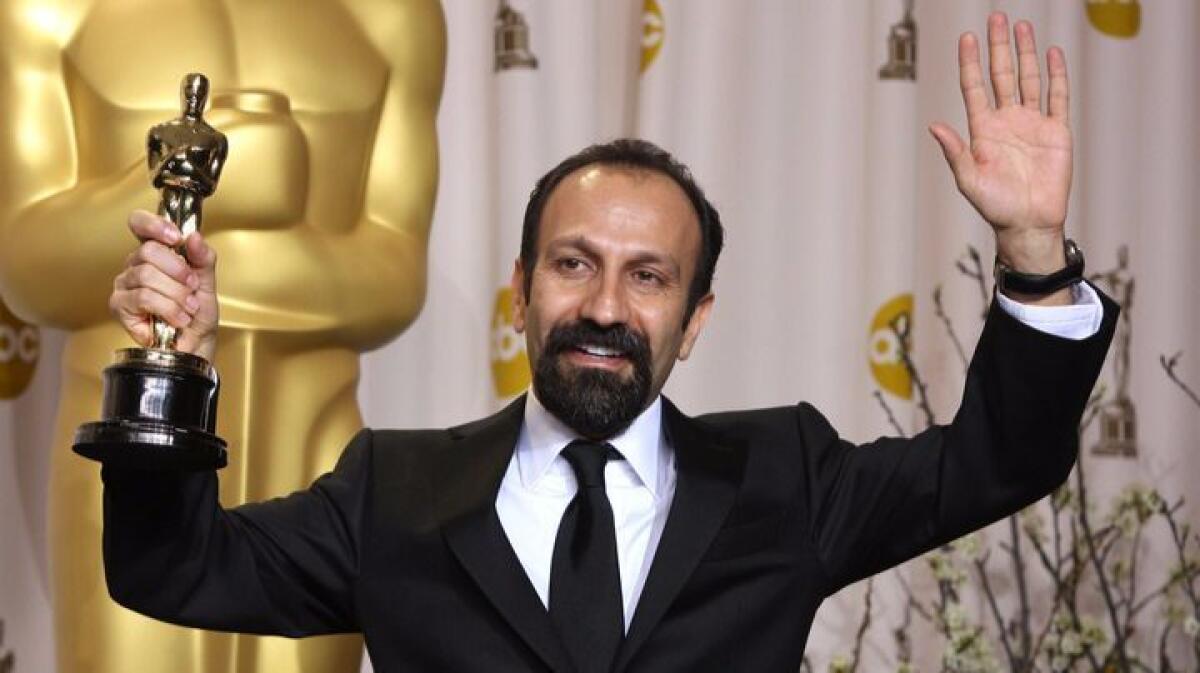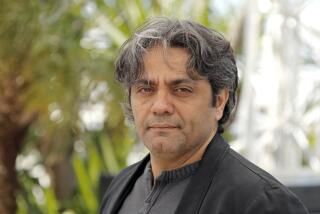Academy stands by Iranian Oscar nominee Asghar Farhadi in face of ‘extremely troubling’ Trump travel ban

- Share via
A day after President Trump signed an executive order banning Syrian refugees and citizens from seven predominantly Muslim countries from entering the United States, the Academy of Motion Picture Arts and Sciences issued a statement denouncing the ban, which may prevent Oscar-nominated Iranian filmmaker Asghar Farhadi from attending the 89th Academy Awards, where his new drama “The Salesman” is nominated for best foreign language film.
“The Academy celebrates achievement in the art of filmmaking, which seeks to transcend borders and speak to audiences around the world, regardless of national, ethnic, or religious differences,” an Academy spokesperson said in a statement.
“As supporters of filmmakers — and the human rights of all people — around the globe, we find it extremely troubling that Asghar Farhadi, the director of the Oscar-winning film from Iran, ‘A Separation,’ along with the cast and crew of this year’s Oscar-nominated film ‘The Salesman,’ could be barred from entering the country because of their religion or country of origin.”
Taraneh Alidoosti, the star of “The Salesman,” announced this week that she would be boycotting the Oscars in protest of what she called a “racist” immigration ban.
Farhadi’s film “A Separation” won the Oscar for best foreign language film in 2012, when he also earned a nomination for best screenplay. Accepting the award onstage, he delivered one of the night’s most powerful speeches.
“At this time, many Iranians all over the world are watching us and I imagine them to be very happy,” he said. “They are happy not just because of an important award or a film or filmmaker, but because at the time when talk of war, intimidation and aggression is exchanged between politicians, the name of their country Iran is spoken here through her glorious culture, a rich and ancient culture that has been hidden under the heavy dust of politics. I proudly offer this award to the people of my country, a people who respect all cultures and civilizations and despise hostility and resentment.”
It remains to be seen if other prominent Hollywood figures will join Alidoosti in boycotting the Feb. 26 ceremony, to be held at the Dolby Theatre.
Late Friday night, president of the National Iranian-American Council Trita Parsi told The Times that Farhadi has only an Iranian passport, which would leave him subject to the ban unless he applied and was granted an artistic exception.
“The law is very clear and I’ve heard confirmation that he is not coming,” Parsi said. “I find it unlikely that they would be able to [make an exception for Farhadi] – and that is assuming the Trump administration would want to.”
It’s worth noting that the academy has made a concerted effort in the past few years to become a more global organization. Of last year’s class of invitees, more than 40% were from outside the U.S., including “Wadjda” filmmaker Haifaa al-Mansour, Saudi Arabia’s first female director.
Asked last month to comment on the academy’s push toward inclusiveness in light of the election of Donald Trump, academy president Cheryl Boone Isaacs told The Times, “That question is very interesting – ‘What kind of country are we?’ – and I guess that’s what we’re really wrestling with here, with a couple of very different views of what it is.”
“For the academy, I would say that we know who we are.”
Times staff writer Josh Rottenberg contributed to this report.
ALSO
Families divided by Trump’s refugee order worry about the future
Confusion and consternation as new ‘extreme vetting’ policy blocks Middle East immigration
Immigration attorneys at LAX helping immigrants, many from Iran, detained by federal officials
More to Read
Only good movies
Get the Indie Focus newsletter, Mark Olsen's weekly guide to the world of cinema.
You may occasionally receive promotional content from the Los Angeles Times.











